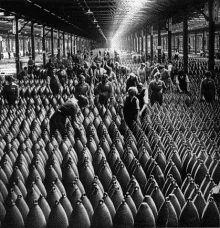Women's Poetry & Verse
Introduction
There is a strong but neglected tradition of women's poetry written in response to the events of the First World War. Many of these poems are the products of direct experience of the processes of war — making weapons, nursing the wounded, the loss of brothers, sons, or lovers in the trenches — by women on active service in the battle areas as well as by women involved in the war effort at home. The range of this poetry is wide. It is often experimental and in advance of the male poetic response. Some of the women poets are well known in other contexts — like Rose Macauley, Edith Nesbit, and Edith Sitwell — others are largely unknown. It was an American woman poet, Harriet Monroe, who founded and edited Poetry, the first American periodical devoted exclusively to verse, and who published some of Rosenberg's work. Below are some examples of such works by a number of women poets of the period.
Poem selections
Munition Wages
Earning high wages?
Yus, Five quid a week.
A woman, too, mind you,
I calls it dim sweet.Ye'are asking some questions -
But bless yer, here goes:
I spends the whole racket
On good times and clothes.Me saving? Elijah!
Yer do think I'm mad.
I'm acting the lady,
But - I ain't living bad.I'm having life's good times.
See 'ere, it's like this:
The 'oof come o' danger,
A touch-and-go bizz.We're all here today, mate,
Tomorrow - perhaps dead,
If Fate tumbles on us
And blows up our shed.Afraid! Are yer kidding?
With money to spend!
Years back I wore tatters,
Now - silk stockings, mi friend!I've bracelets and jewellery,
Rings envied by friends;
A sergeant to swank with,
And something to lend.I drive out in taxis,
Do theatres in style.
And this is mi verdict -
It is jolly worth while.Worth while, for tomorrow
If I'm blown to the sky,
I'll have repaid mi wages
In death - and pass by.
Madeline Ida Bedford
SMH, pp. 7–8
Pluck
Crippled for life at seventeen,
His great eyes seem to question why:
With both legs smashed it might have been
Better in that grim trench to die
Than drag maimed years out helplessly.A child - so wasted and so white,
He told a lie to get his way,
To march, a man with men, and fight
While other boys are still at play.
A gallant lie your heart will say.So broke with pain, he shrinks in dread
To see the 'dresser' drawing near;
And winds the clothes about his head
That none may see his heart-sick fear.
His shaking, strangled sobs you hear.But when the dreaded moment's there
He'll face us all, a soldier yet,
Watch his bared wounds with unmoved air,
(Though tell-tale lashes still are wet),
And smoke his woodbine cigarette.
Eva Dobell
SMH, p. 31
Appears by permission of Patrick Dobell, Literary Executor for Eva Dobell
The Wind on the Downs
I like to think of you as brown and tall,
As strong and living as you used to be,
In khaki tunic, Sam Brown belt and all,
And standing there and laughing down at me.
Because they tell me, dear, that you are dead,
Because I can no longer see your face,
You have not died, it is not true, instead
You seek adventure in some other place.
That you are round about me, I believe;
I hear you laughing as you used to do,
Yet loving all the things I think of you;
And knowing you are happy, should I grieve?
You follow and are watchful where I go;
How should you leave me, having loved me so?We walked along the tow-path, you and I,
Beside the sluggish-moving, still canal;
It seemed impossible that you should die;
I think of you the same and always shall.
We thought of many things and spoke of few,
And life lay all uncertainly before,
And now I walk alone and think of you,
And wonder what new kingdoms you explore.
Over the railway line, across the grass,
While up above the golden wings are spread,
Flying, ever flying overhead,
Here still I see your khaki figure pass,
And when I leave the meadow, almost wait
That you should open first the wooden gate.
Marian Allen
SMH, p. 1
The Call
Who's for the trench -
Are you, my laddie?
Who'll follow French -
Will you, my laddie?
Who's fretting to begin,
Who's going out to win?
And who wants to save his skin -
Do you, my laddie?Who's for the khaki suit -
Are you, my laddie?
Who longs to charge and shoot -
Do you, my laddie?
Who's keen on getting fit,
Who means to show his grit,
And who'd rather wait a bit -
Would you, my laddie?Who'll earn the Empire's thanks -
Will you, my laddie?
Who'll swell the victor's ranks -
Will you, my laddie?
When that procession comes,
Banners and rolling drums -
Who'll stand and bite his thumbs -
Will you, my laddie?
Jessie Pope
SMH, p. 88
Over the Top
Ten more minutes! - Say yer prayers,
Read yer Bibles, pass the rum!
Ten more minutes! Strike me dumb,
'Ow they creeps on unawares,
Those blooming minutes. Nine. It's queer,
I'm sorter stunned. It ain't with fear!Eight. It's like as if a frog
Waddled round in your inside,
Cold as ice-blocks, straddle wide,
Tired o' waiting. Where's the grog?
Seven. I'll play yer pitch and toss -
Six. - I wins, and tails yer loss.'Nother minute sprinted by
'Fore I knowed it; only Four
(Break 'em into seconds) more
'Twixt us and Eternity.
Every word I've ever said
Seems a-shouting in my head.Three. Larst night a little star
Fairly shook up in the sky,
Didn't like the lullaby
Rattled by the dogs of War.
Funny thing - that star all white
Saw old Blighty, too, larst night.Two. I ain't ashamed o' prayers,
They're only wishes sent ter God
Bits o' plants from bloody sod
Trailing up His golden stairs.
Ninety seconds - Well, who cares!
One -
No fife, no blare, no drum -
Over the Top - to Kingdom Come!
Sybil Bristowe
SMH, p. 13



